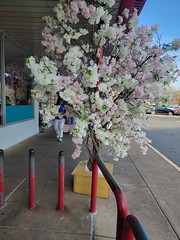Japan’s new ambassador to China Kenji Kanasugi: Push relations forward, even one or two steps forward
[DeepL machine translation. Chinese text at 日本新任驻华大使金杉宪治:推动两国关系向前发展,哪怕前进一两步 Some URLs added to the translation below]
Source: Global Times article by Xing Xiaojing and Liu Xin
January 24, 2024
[Global Times report by reporters Xing Xiaojing and Liu Xin]
Since the Japanese government “officially announced” Kenji Kanasugi as the new ambassador to China, this diplomat, who is not from the “Chinese school”, has been receiving attention from the outside world. One month after his arrival in Beijing, Kenji Kanasugi gave an exclusive interview to the Global Times at the residence of the Embassy of Japan in Beijing on January 18. This was also his first interview with the Chinese media in his new capacity. In the interview, Kenji Kanasugi described his diplomatic work as a “relay race” and said, “Holding the baton in my hand, I want to run as far as possible”. He emphasized that during his term of office, he would like to make use of his experience to promote mutual exchanges between Japan and China and contribute to the improvement of relations between the two countries.
Will Promote mutual exchanges between Japan and China during his term of office
Global Times: After getting the news that you will be Japan’s new ambassador to China, we have learned from some Chinese and Japanese people who have had contact with you that you are highly regarded as a professional diplomat who is expected to open up the way for improvement of Sino-Japanese relations despite his non-China specialist background. How do you feel about the high evaluation and expectations from the outside world? Can you tell us about your priorities and goals during your tenure as Ambassador to China?
Kenji Kanasugi: Of course, as a diplomat, it is a great honor to receive such appreciation. I hope that this will lead to more recognition of the Japanese people, Japanese companies and Japan than of me personally. In fact, I am not an expert on China, and as you know, I served as the Director of the Asia-Oceania Bureau of the Ministry of Foreign Affairs, which is responsible for Japan-China relations, and as the Foreign Affairs Reviewer in charge of the economy from 2016 to 2019, which allowed me to gain some on-the-spot experience in engaging in Japan-China relations. At that time, the gears of (improving) Japan-China relations gradually began to turn as a series of talks were held between the top echelons of the two countries, and the late then-Prime Minister of Japan, Shinzo Abe, paid an official visit to China in October 2018, when I also visited Beijing as part of a delegation. I hope to utilize these experiences of mine to make a modest contribution to moving Japan-China relations forward.
An important part of the work of an ambassador or embassy is to ensure the safety of Japanese nationals in China and to work to increase the rights and interests of Japanese companies. To this end, I believe that there is still a need to strengthen communication between Japan and China. For about three years, communication between Japan and China was disrupted by the epidemic, as of course is the case with all countries. However, now that the epidemic has passed and the Japan-China summit talks (i.e., the meeting between the leaders of China and Japan – ed., same below) were held last November, there is a sense that relations between the two sides are improving. Therefore, I hope that by promoting mutual exchanges between Japan and China, I can contribute to the improvement of relations between the two countries.
Global Times: Among your previous visits to China, which one was the most impressive? What kind of mood is it to come to China this time as the new ambassador to China?
Kenji Kanasugi: My most memorable visit was in October 2018 when I accompanied the then Japanese prime minister to Beijing. At that time, I was directly involved as the Director of the Asia and Oceania Bureau of the Ministry of Foreign Affairs, and that made a deep impression on me. Also, about 10 years ago, there were voices saying that Beijing’s air pollution was serious, but I was pleasantly surprised that the air was very fresh and I could see blue sky on that visit. I am deeply honored to be working in China this time as a diplomat, and as an ambassador to China, one of the most important countries for Japan, in a sense, I cannot afford to slack off. I will do everything I can to move Japan-China relations forward, even if it is only a step or two.
Things will move forward if we start talking to each other again and start a dialog.
Global Times: President Xi Jinping met with Prime Minister Fumio Kishida in San Francisco on Nov. 16, https://www.mofa.go.jp/a_o/c_m2/ch/page4e_001005.html2023, local time. The two leaders reaffirmed their commitment to the principles and consensus of the four Sino-Japanese political documents, reconfirmed the positioning of the two countries’ relationship as a comprehensive promotion of strategic reciprocity, and committed themselves to building a constructive and stable Sino-Japanese relationship that meets the requirements of the new era. How do you see the significance of this meeting?
Kenji Kanasugi: Japan and China signed a joint statement on comprehensively advancing the strategic and mutually beneficial relationship in 2008, the main content of which is that Japan and China, as neighboring countries, are facing a variety of challenges, and the two sides should join hands to deal with the challenges together. At the same time, there are many areas where Japan and China can deepen their cooperation. I believe that deepening cooperation in areas where cooperation is possible is a connotation of comprehensively advancing the strategic and mutually beneficial relationship between the two countries. However, the relationship between Japan and China became somewhat strained during the outbreak when people-to-people exchanges between the two countries were disrupted. In this context, the meeting between the leaders of Japan and China to reconfirm the positioning of the two countries’ relationship of comprehensively promoting the strategic reciprocal relationship is of great significance for deepening the cooperation between Japan and China.
Global Times: What actions will the Japanese side take to implement the important consensus between the two leaders?
Kenji Kanasugi: First of all, I think there is a need to deepen exchanges between various communication channels. As I said earlier, communication and people-to-people exchanges between Japan and China were interrupted for a while during the epidemic. However, now that we have reconfirmed the broad framework of comprehensively advancing the strategic reciprocal relationship, it is very important to use this as a basis for advancing dialogue at all levels. In fact, at the Japan-China summit meeting and other occasions, consensus was reached on the Japan-China High-Level Economic Dialogue, the Japan-China Humanities Exchange Dialogue, and the exchange of visits by foreign ministers. Such interactions are important for promoting people-to-people exchanges. More importantly, it is important for the people of the two countries to see that outstanding issues are being resolved through such exchanges, and that things will move forward once exchanges and dialogues are restarted.
Global Times: China-U.S. relations are expected to warm up to some extent after the meeting between the Chinese and U.S. heads of state on the sidelines of the informal Asia-Pacific Economic Cooperation (APEC) leaders’ meeting in San Francisco. Do you think that China-Japan relations may also see a turnaround in this regard?
Kenji Kanasugi: Japan-China relations are not determined by China-U.S. relations, and Japan’s foreign policy is based solely on Japan’s national interests, which is a major premise. Under this premise, last November the two sides reconfirmed the positioning of the two countries’ relations in terms of comprehensively advancing the strategic and mutually beneficial relationship, and I expect Japan-China relations to make progress under this important broad framework.
Global Times: However, there is a view that China-Japan relations will also be affected by China-U.S. relations.
Kenji Kanasugi: Because we are in the middle of the international community, the influence from the U.S.-China relationship will not be zero. And, if Japan-China relations are improving, I think that will certainly have an impact on U.S.-China relations as well. The international community is interdependent, and I think the discussion (above) should be based on that.
Hold the baton in your hand and try to run as far as possible
Global Times: We noticed that you often wore local national costumes when you served as Japan’s ambassador to Indonesia, will you try to wear Chinese national costumes?
Kenji Kintsugi: There is a traditional dress called “Batik” in Indonesia, and the reason why I often wear it is because (according to the Indonesian custom) wearing “Batik” can be used to attend any event, such as meeting the president, attending a wedding, or going to work, which is very convenient and Indonesian people wear it. It’s very convenient, and all Indonesians wear it. So not only me, but also the staff of the embassy often wear “Badik”. However, I still need to wear a suit to attend formal events in China, so I usually wear a suit at work.
Global Times: When you were in Indonesia, you would share your daily life through social media, do you plan to create a social media account after coming to China?
Kenji Kintsugi: I’ve only been here for a month, so I don’t know yet. I’m willing to consider it if it will help promote Japan-China relations.
Global Times: Although you have just assumed your new post, I still want to ask this question: What kind of state do you hope to see in Sino-Japanese relations when you leave China?
Kenji Kintsugi: There is a very popular sport in Japan called “relay race”, in which the baton is passed from baton to baton during a long-distance race. I believe that our work is like a relay race, in which we take the baton from our predecessor, run as far as possible during our term of office, and then pass the baton on to the next person. I hope that during my term of office, (Japan-China relations) can move forward, even if it is only one or two steps. I’ve just been here for a month, and right now I want to do as much as possible to solve the problems we’re facing.
Global Times: What places would you like to visit during your stay in China?
Kenji Kintsugi: China is a vast country with a lot of beautiful landscapes, and there are also many places I don’t know much about. During my stay in China, I would like to travel and see more, and also deepen my personal experience. Many Japanese people, especially those of my generation, are very interested in the Silk Road, so I would like to see it as well. For my work, I would like to prioritize visiting the consular district of the Embassy of Japan in China and the Consulates General of Japan in other cities.
Global Times: In your opinion, what kind of relationship between China and Japan exists for Asia and the world?
Kenji Kintsugi: When I left Indonesia, there were many Indonesian friends who saw me off. They said to me, “The stability of Japan-China relations is very important for Indonesia and for ASEAN, so please make sure you work hard.” I will keep these voices in mind as I work (in China).
日本新任驻华大使金杉宪治:推动两国关系向前发展,哪怕前进一两步
来源:环球时报 作者:邢晓婧 刘欣
【环球时报报道 记者 邢晓婧 刘欣】日本政府“官宣”由金杉宪治担任新任驻华大使以来,这位非“中国学派”出身的外交官一直受到外界关注。抵京履新一个月之际,金杉宪治于1月18日在日本驻华大使馆官邸接受了《环球时报》记者的独家专访,这也是他以新身份首次接受中国媒体采访。在采访中,金杉宪治将外交工作形容为“驿站长跑接力赛”,并表示“手握接力棒,要尽可能地跑得更远”。他强调,在任期内希望利用自身经验,促进日中之间的相互交流,为推动改善两国关系贡献力量。

任内促进日中相互交流
环球时报:得到关于您将出任日本新任驻华大使的消息以后,我们通过一些和您有过接触的中日人士了解到,他们对您的评价非常高,认为您是一位专业外交官,尽管是非“中国学派”出身,但有望为改善中日关系打开局面。您如何看待外界的高评价和高期待?能否介绍一下,您在担任驻华大使期间的工作重点和工作目标?
金杉宪治:当然,作为一名外交官,能够得到这样的赞赏是莫大的荣幸。相较于对我个人的认可,我更希望这能带动大家对于日本民众、日本企业以及日本的认可。实际上,我并不是中国问题专家,正如您所知,我从2016年到2019年担任过负责日中关系的外务省亚洲大洋洲局局长,也担任过负责经济的外务审议官,这让我获得一些现场参与日中关系的经验。当时,随着日中两国高层之间举行了一系列的会谈,(改善)日中关系的齿轮逐渐开始转动,已故时任日本首相安倍晋三于2018年10月对中国进行了正式访问,那时我也作为代表团中的一员到访北京。我希望利用自己的这些经验,为推动日中关系前进贡献绵薄之力。
大使或大使馆工作的一个重要部分是确保在华日本人的安全,并努力增加日本企业的权益。为此,我认为日中之间仍然需要加强沟通。受到疫情影响,在大约3年的时间里,日本和中国之间的交流一度中断,当然所有国家都是如此。但现在疫情已经过去,去年11月还举行了日中首脑会谈(即中日领导人会晤——编者注,下同),感觉双方关系正在好转。因此,我希望通过促进日中之间的相互交流,推动改善两国关系。
环球时报:在您此前的访华经历中,印象最深的是哪次?这次以新任驻华大使的身份来到中国,是一种什么心情?
金杉宪治:我最难忘的是2018年10月陪同当时的日本首相到访北京。那时我作为外务省亚洲大洋洲局局长,直接参与了相关工作,这让我印象深刻。而且,大概10年前,有声音说北京的大气污染很严重,但是那次来北京空气很清新,还能看到蓝天,让我感到很惊喜。这次来到中国工作,作为一名外交官,我深感荣幸,而作为大使来到中国——这个对日本来说最为重要的国家之一,从某种意义上来说,不能有丝毫懈怠。我会想方设法推动日中关系向前发展,哪怕只能前进一两步也好。
重新往来、开始对话,事情就会向前发展
环球时报:当地时间2023年11月16日,习近平主席在旧金山会见岸田文雄首相。两国领导人重申恪守中日四个政治文件的原则和共识,重新确认全面推进战略互惠关系的两国关系定位,致力于构建契合新时代要求的建设性、稳定的中日关系。您如何看待此次会见的重要意义?
金杉宪治:日中两国于2008年签署了关于全面推进战略互惠关系的联合声明,其主要内容是,日中作为邻国,面临各种挑战,双方应该携手共同应对挑战。与此同时,日中两国还有很多可以深化合作的领域。我认为在可以合作的领域加深合作是全面推进两国战略互惠关系的内涵。然而,疫情期间日中之间的人员往来中断,两国关系也变得有些疙疙瘩瘩。在此背景下,日中两国领导人会晤时重新确认全面推进战略互惠关系的两国关系定位,对于深化日中合作具有重要意义。
环球时报:日方将采取哪些行动落实两国领导人的重要共识?
金杉宪治:首先,我认为需要深化各种沟通渠道之间的交流。正如我刚才所言,疫情期间日中之间的沟通和人员往来一度中断。但既然已经重新确认了全面推进战略互惠关系这一大框架,那么就应该以此为基础,推进各个层面的对话,这一点非常重要。实际上,在日中首脑会谈等场合也就日中经济高层对话、日中人文交流对话、外相外长互访等内容达成共识。这样的交往对于促进人员往来十分重要。更重要的是,要让两国民众看到,悬而未决的问题正在通过这种交流得到解决,一旦重新开始往来、开始对话,事情就会向前发展。
环球时报:中美元首在旧金山亚太经合组织(APEC)领导人非正式会议期间实现会晤,中美关系有望在一定程度上回暖。您是否认为,中日关系也有可能就此迎来转机?
金杉宪治:日中关系并不是由中美关系来决定的,日本的外交政策完全基于日本的国家利益,这是一个大前提。在此前提下,去年11月双方重新确认全面推进战略互惠关系的两国关系定位,我期待日中关系能在这一重要的大框架下取得进展。
环球时报:然而,有观点认为中日关系也会受到中美关系的影响。
金杉宪治:因为我们身处国际社会当中,所以来自美中关系的影响不会是零。而且,如果日中关系正在得到改善的话,我认为这当然也会对美中关系产生影响。国际社会是一种相互依存的关系,我认为(上述观点)应该是基于此进行讨论的。
手握接力棒,尽量跑更远
环球时报:我们注意到,您在担任日本驻印尼大使时经常身着当地民族服装,您会尝试穿中国的民族服装吗?
金杉宪治:印尼有一种名为“巴迪克(Batik)”的传统服饰,我之所以经常穿是因为(按照印尼习俗)身着“巴迪克”可以出席任何活动,见总统、参加婚礼、上班都可以,非常方便,印尼人都这样穿。所以不仅是我,大使馆的工作人员也都经常穿着“巴迪克”。但是在中国出席正式活动还是需要穿西装,所以我平时在工作中也都是穿西装的。
环球时报:您在印尼时会通过社交媒体与大家分享日常生活,来中国之后有计划创建社交媒体账号吗?
金杉宪治:我才来一个月,还不知道。如果对促进日中关系有所帮助的话,我愿意考虑一下。
环球时报:虽然您刚刚履新,我仍然想问这样一个问题,您希望在离开中国的时候,看到中日关系可以呈现出一种怎样的状态?
金杉宪治:日本有一种很受欢迎的运动叫“驿站长跑接力赛”,在长距离的赛跑过程中,接力棒一棒一棒地传递下去。我认为我们的工作就像接力赛一样,从前任手中接过接力棒,在自己的任期内尽可能地跑得更远,再把接力棒传给下一任。我希望在我的任期内,(日中关系)可以向前迈进,哪怕只有一两步。我刚来一个月,眼下我想尽可能多地为解决当前所面临的问题而努力。
环球时报:在华期间想去哪些地方?
金杉宪治:中国地大物博,有很多风景优美的地方,也有很多我不太了解的地方。在中国期间,我想多走走、多看看,也可以加深个人体验。很多日本人,尤其是我这一代人,十分向往“丝绸之路”,所以我也想去看看。出于工作层面考虑的话,我想要优先参访日本驻华大使馆的领区,还有分布在其他城市的日本总领事馆等地。
环球时报:您认为,中日关系对于亚洲乃至世界是怎样的存在?
金杉宪治:在我离开印尼时,有很多印尼朋友为我送行。他们对我说,“日中关系的稳定,对印尼、对东盟而言都非常重要,请你一定努力”。我会在(中国的)工作中,牢记这些声音。



